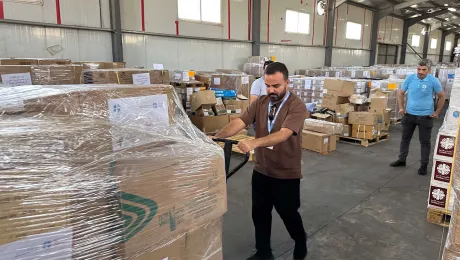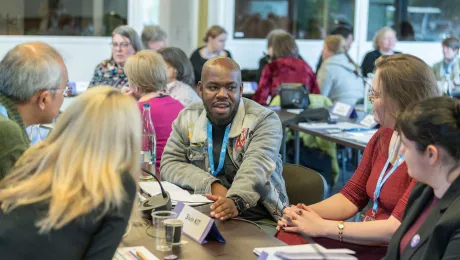
Participants in the Sibiu workshop were invited to create a map depicting âWho is moving to my country and why?â and âWho is leaving my country and why?â Photo: Ulla Siirto
Lutheran diaconal workers in Europe examine migration ‘bridges or walls’
(LWI) - What are the “actual” and “personal” borders that stop people from living together in peace with unfamiliar cultures, faiths and gender identities?
Delegates from 14 member churches of The Lutheran World Federation (LWF) examined this question during a workshop held in Sibiu, Central Romania, in mid-December, under the theme “People on the Move – Bridges or Walls?” It was part of the European Diaconal Process, which brings together diaconal practitioners from LWF member churches in Central Eastern Europe, Central Western Europe and Nordic regions.
Addressing participants, Bishop Reinhart Guib of the Evangelical Church of the Augsburg Confession in Romania (ECACR) emphasized the focus on individual persons, and used the phrase “people, not numbers” to describe the congregations of Transylvanian Saxons, left in Romania after the 1990s post-communist era exodus. He said migration to and within Europe currently and in the past, has been important for the mission of the church, which joined the LWF in 1964.
The International Academy for Diaconia and Social Action, Central & Eastern Europe (interdiac), which supports LWF member churches in promoting best practices of diaconal service in the region, was represented by its head of education, Rev. Tony Addy and manager Janka Adameová.
Addy explained conviviality as a concept that “focuses attention on relationships.” It relates to ‘La convivencia’ – a period of several hundred years in the history of the Iberian Peninsula when Christians, Jews and Muslims coexisted in relative peace, he said.
Changing role of faith and religion
Among key topics at the workshop were the growing cultural and religious diversities in Europe and the changing roles of faith and religion. Delegates noted that people fleeing persecution -- whether Christian, Muslim or of another faith identity -- value their religion as a secure resource when nothing else is stable. In some contexts, however, religion is being used to underpin an exclusionary national identity that supports a xenophobic response, which in some cases can engender conflict in society. Discussion on these concerns led to further exploration of issues related to xenophobia, racism, mobility, migration and refugee movements.
During one of the sessions, Rev. Dorin Cioabā, pastor of a Roma Pentecostal congregation, Dr Holger Lux (Romanian Blue Cross) and Erika Klemm (ECACR advisor for migration) introduced participants to the specifically Romanian aspects of diaconal work.
Delegates heard how the ‘Refugee Round Table’ set up by ECACR with participants from other churches, discusses pastoral work among refugees including a program called “I am a Stranger” that explores the biblical contexts of being a stranger. The LWF member church also observes a ‘Refugee Sunday’ which it is encouraging other churches to join. Its work extends to students and teachers, who participate in workshops on migration and migrants, including a traveling exhibition that has reached more than 3,000 students.
Diverse backgrounds
Participants reflected on what it means to seek conviviality in the distinctly different contexts in Europe. For example, in secular countries like the Czech Republic, religion and faith communities do not seem to play an important role in the wider society. On the other hand, there are countries in which Christians are a majority but Lutherans tend to be in a minority position, and there are others where Islam is the dominant religion. These diverse backgrounds, also in Central Western and Nordic Europe, helped participants to examine questions of identity and theological motives that underpin church social action. They also discussed ways of countering growing hate speech and populism.
There is an urgent need to look for ways to live together in peace and harmony in times of fragmentation and growing tensions among different groups in Europe.
LWF Area Secretary for Europe, Rev. Dr Ireneusz Lukas, said "there is an urgent need to look for ways to live together in peace and harmony in times of fragmentation and growing tensions among different groups in Europe.” The diaconal process, he added, “contributes to mutual understanding and cooperation on the continent.”
March 2019 in the Netherlands
The Sibiu gathering was the first in a new phase that will develop guidelines for diaconal practice, teaching materials and proposals to change church and public policy related to the core theme “Seeking Conviviality – the art and practice of living together.” The next workshop will be held in March this year in the Netherlands, and will focus on “People on the Move – Responding to Growing Diversity.”
The LWF and interdiac began the conviviality process in 2011, bringing together diaconal practitioners from the three LWF regions in Europe. The process has resulted in a number of publications introducing the core concept of ‘Seeking Conviviality’ and advocacy. It was presented at the 2017 LWF Twelfth Assembly in Windhoek, Namibia, and shared with the member churches in Africa, Asia and Latin America and the Caribbean.
By LWF program assistant Monika Rawcliffe, edited by LWF Communications.


